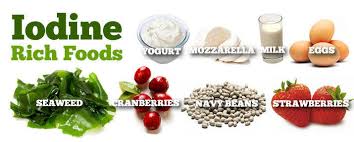
Iodine
Iodine is a mineral which was first discovered in 1812 in kelp. Iodine was extracted and given its name because of its violet color. It occurs naturally and is a crucial constituent of the thyroid hormone which monitors out energy levels. Iodine deficiency is one of the key world health problems and at least 200 million people suffer from conditions linked to inadequate iodine in the diet. Lack of iodine can cause goiter, hypothyroidism, cretinism, and can eventually lead to myxedema.
Properties
- Determines the level of metabolism and energy in the body
- Relieves the pain of fibrocystic breasts
- Protects against the toxic effects of exposure to radioactive materials
- Prevents goiter
- Prevents thyroid disorders
- Loosen mucus in the respiratory tract
- Natural antiseptic
Best Sources
- Seafood and seaweed
- Most table salt is fortified with iodine
Dosage
Take under the supervision of a physician or nutritionist. 150 mcg RDA iodine is adequate.
***CAUTION***
Iodine is toxic in high doses and may aggravate or cause acne. Large doses may interfere with hormone activity. Cruciferous foods like cabbage, brussels sprouts, cauliflower, and broccoli contain substances which can cause hypothyroidism by antagonizing iodine. Anyone who eats large quantities of these vegetables should consider an iodine supplement.



Comment ( 1 )
Thanks again for the blog.Thanks Again. Keep writing.